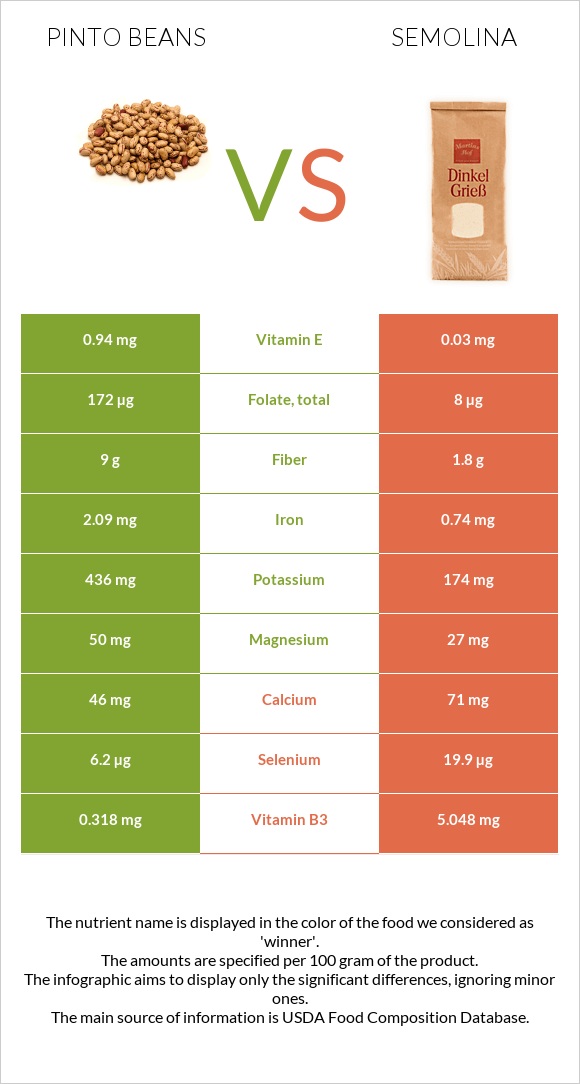Pinto beans vs. Semolina — In-Depth Nutrition Comparison
Compare
How are pinto beans and semolina different?
- Pinto beans is higher in folate, fiber, iron, and potassium; however, semolina is richer in vitamin B3, manganese, selenium, vitamin B6, vitamin B5, and copper.
- Daily need coverage for folate for pinto beans is 41% higher.
- Pinto beans contains 5 times more fiber than semolina. While pinto beans contains 9g of fiber, semolina contains only 1.8g.
- Pinto beans has a lower glycemic index (39) than semolina (54).
Beans, pinto, mature seeds, cooked, boiled, without salt and Rice, white, long-grain, parboiled, unenriched, dry are the varieties used in this article.
Infographic

Infographic link
Mineral Comparison
Mineral comparison score is based on the number of minerals by which one or the other food is richer. The "coverage" charts below show how much of the daily needs can be covered by 300 grams of the food.
| Contains more MagnesiumMagnesium | +85.2% |
| Contains more PotassiumPotassium | +150.6% |
| Contains more IronIron | +182.4% |
| Contains less SodiumSodium | -50% |
| Contains more CalciumCalcium | +54.3% |
| Contains more CopperCopper | +29.7% |
| Contains more ManganeseManganese | +128.5% |
| Contains more SeleniumSelenium | +221% |
Vitamin Comparison
Vitamin comparison score is based on the number of vitamins by which one or the other food is richer. The "coverage" charts below show how much of the daily needs can be covered by 300 grams of the food.
| Contains more Vitamin CVitamin C | +∞% |
| Contains more Vitamin EVitamin E | +3033.3% |
| Contains more Vitamin B2Vitamin B2 | +24% |
| Contains more Vitamin KVitamin K | +3400% |
| Contains more FolateFolate | +2050% |
| Contains more Vitamin B1Vitamin B1 | +16.1% |
| Contains more Vitamin B3Vitamin B3 | +1487.4% |
| Contains more Vitamin B5Vitamin B5 | +220% |
| Contains more Vitamin B6Vitamin B6 | +97.4% |
All nutrients comparison - raw data values
| Nutrient |  |
 |
DV% diff. |
| Folate | 172µg | 8µg | 41% |
| Vitamin B3 | 0.318mg | 5.048mg | 30% |
| Fiber | 9g | 1.8g | 29% |
| Manganese | 0.453mg | 1.035mg | 25% |
| Selenium | 6.2µg | 19.9µg | 25% |
| Starch | 15.15g | 68.29g | 22% |
| Carbs | 26.22g | 80.89g | 18% |
| Iron | 2.09mg | 0.74mg | 17% |
| Vitamin B6 | 0.229mg | 0.452mg | 17% |
| Calories | 143kcal | 374kcal | 12% |
| Vitamin B5 | 0.21mg | 0.672mg | 9% |
| Potassium | 436mg | 174mg | 8% |
| Copper | 0.219mg | 0.284mg | 7% |
| Vitamin E | 0.94mg | 0.03mg | 6% |
| Choline | 35.3mg | 6% | |
| Magnesium | 50mg | 27mg | 5% |
| Protein | 9.01g | 7.51g | 3% |
| Calcium | 46mg | 71mg | 3% |
| Vitamin B1 | 0.193mg | 0.224mg | 3% |
| Vitamin K | 3.5µg | 0.1µg | 3% |
| Fats | 0.65g | 1.03g | 1% |
| Vitamin C | 0.8mg | 0mg | 1% |
| Phosphorus | 147mg | 153mg | 1% |
| Vitamin B2 | 0.062mg | 0.05mg | 1% |
| Saturated fat | 0.136g | 0.294g | 1% |
| Polyunsaturated fat | 0.235g | 0.322g | 1% |
| Net carbs | 17.22g | 79.09g | N/A |
| Sugar | 0.34g | 0.33g | N/A |
| Zinc | 0.98mg | 1.02mg | 0% |
| Sodium | 1mg | 2mg | 0% |
| Monounsaturated fat | 0.133g | 0.258g | 0% |
| Tryptophan | 0.108mg | 0.103mg | 0% |
| Threonine | 0.331mg | 0.271mg | 0% |
| Isoleucine | 0.426mg | 0.339mg | 0% |
| Leucine | 0.765mg | 0.656mg | 0% |
| Lysine | 0.63mg | 0.215mg | 0% |
| Methionine | 0.117mg | 0.183mg | 0% |
| Phenylalanine | 0.531mg | 0.398mg | 0% |
| Valine | 0.519mg | 0.47mg | 0% |
| Histidine | 0.247mg | 0.185mg | 0% |
| Fructose | 0g | 0.02g | 0% |
Macronutrient Comparison
Macronutrient breakdown side-by-side comparison
Protein:
9.01 g
Fats:
0.65 g
Carbs:
26.22 g
Water:
62.95 g
Other:
1.17 g
Protein:
7.51 g
Fats:
1.03 g
Carbs:
80.89 g
Water:
9.86 g
Other:
0.71 g
| Contains more ProteinProtein | +20% |
| Contains more WaterWater | +538.4% |
| Contains more OtherOther | +64.8% |
| Contains more FatsFats | +58.5% |
| Contains more CarbsCarbs | +208.5% |
Fat Type Comparison
Fat type breakdown side-by-side comparison
Saturated fat:
Sat. Fat
0.136 g
Monounsaturated fat:
Mono. Fat
0.133 g
Polyunsaturated fat:
Poly. Fat
0.235 g
Saturated fat:
Sat. Fat
0.294 g
Monounsaturated fat:
Mono. Fat
0.258 g
Polyunsaturated fat:
Poly. Fat
0.322 g
| Contains less Sat. FatSaturated fat | -53.7% |
| Contains more Mono. FatMonounsaturated fat | +94% |
| Contains more Poly. FatPolyunsaturated fat | +37% |
Carbohydrate type comparison
Carbohydrate type breakdown side-by-side comparison
Starch:
15.15 g
Sucrose:
0.34 g
Glucose:
0 g
Fructose:
0 g
Lactose:
0 g
Maltose:
0 g
Galactose:
0 g
Starch:
68.29 g
Sucrose:
0.21 g
Glucose:
0.11 g
Fructose:
0.02 g
Lactose:
0 g
Maltose:
0 g
Galactose:
0 g
| Contains more SucroseSucrose | +61.9% |
| Contains more StarchStarch | +350.8% |
| Contains more GlucoseGlucose | +∞% |
| Contains more FructoseFructose | +∞% |
~equal in
Lactose
~0g
~equal in
Maltose
~0g
~equal in
Galactose
~0g





